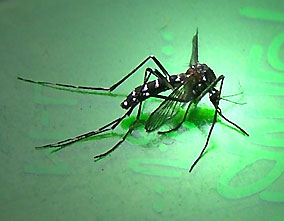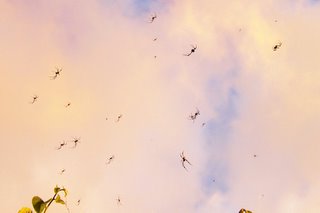A mantis ponders Volcanoes erupt Cyclones dance Paradise in Concrete wellies
Tuesday, February 28, 2006
Who you gonna call?
We have now been promisd lots of money.
Someone is going to profit, but will it actually help?
The BBC is now headlining articles on the "disease island" which doesn't exactly sit comfortably alongside other more pleasing descriptions.
Tourism is down 60%, but then given that bird flu has arrived in France it will at least reduce the chances of it being transported here via that route.
There, life is not all that bad.
Wednesday, February 22, 2006

A la Réunion , le chiffres sont encore plus alarmants 15 à 17 % des adultes (plus de 100 000 réunionnais) sont en surpoids et 16,3% des enfants et adolescents sont obèses (enquête PMI,sep.2003) .
A la Réunion, une enquête effectuée entre 1999 et 2001 sur un échantillon aléatoire de 3600 sujets de 10 à 69 ans a montré une prévalence du diabète de 17,7 %.
A la Réunion, la prévalence brute des patients traités par dialyse est deux fois plus élevée qu'en France (4 fois plus après standardisation sur l'âge et le sexe).
La lutte contre l’alcoolisme est à la Réunion une priorité de santé publique.
On estime qu’il y a au moins 50 000 consommateurs excessifs et 20 000 alcoolo-dépendants et que la Réunion serait le département qui a la prévalence de consommation d’alcool à problème chez les patients masculins hospitalisés, la plus élevée de France (40% à la Réunion Vs 15% pour la moyenne nationale ).
source
Tuesday, February 21, 2006
Is the chikungunya really that bad?
Monday, February 20, 2006
Monday is wash day - wash away those Chik blues
Saturday, February 18, 2006
Perhaps it is time to take a break
... nobody talks of anything else and yet nobody is prepared to accept responsibility for the epedemic or its resulting eco/enviro problems. The Journal the other day announced the 47 chik related deaths with a photo of the mosquito responsible and the huge banner "He kills".
Now, let us put this into some sort of perspective. One, this is not malaria (that'll probably turn up after bird flu and before anthrax) and most of all it is not really the Aedes mosquito that is too blame. What manner of heresy is this?
Chikungunya* is spread by the bite of an /Aedes /mosquito,
primarily /Aedes aegypti/. Humans are thought to be the major
source, or reservoir, of *chikungunya* virus for mosquitoes.
Therefore, the mosquito usually transmits the disease by
biting an infected person and then biting someone else. An
infected person cannot spread the infection directly to other
persons (i.e., it is not a contagious disease).
http://chppm-www.apgea.army.mil/news/Chikungunya_Just_the_Facts_Feb_2006.pdf.
The Aedes has been around for a long time and is even to be found in Europe and, of course, throughout the tropics. However, it is not the mosquito that manufactures the virus as a biological weapon in its fight against humanity. Oh no, no it is we the human that carry the virus and the Aedes is merely the messenger. To put it another way, if a human didn't have the virus it couldn't be communicated by the mosquito to another human. One does not kill the postperson, nor the whole postal infrastructure, merely because the postperson brings bills.
Of course we can always take precautions that there are not too many postpersons...
Because humans act as very efficient reservoirs for the virus,
*chikungunya* is most prevalent in urban areas. Epidemics are
sustained by the human-mosquito-human transmission cycle.
The /Aedes /mosquitoes that transmit *chikungunya* breed in a
wide variety of manmade containers which are common
around human dwellings. These containers collect rainwater,
and include discarded tires, flowerpots, old oil drums, animal
water troughs, water storage vessels, and plastic food
containers.
Widespread poverty, year-round tropical climate, environ-
mental disturbance due to war or natural disaster, and lack of
public health infrastructure are all factors that promote
uncontrolled mosquito breeding and are conducive to
outbreaks of *chikungunya*, or other mosquito-borne diseases. (ibid)
So, if this analogy is all proving a bit to obscure try thinking of it like this:
If you don't want to receive gas bills in the post, don't use the gas. If you insist on using the gas, electric, water, telephone etc etc then we will need a bigger postal service and you will receive more and more bills.
Look, I have no idea where the chik virus comes from nor where it is going to. Diseases are a fact of life and, like the plague, it is us - you and me - that create the conditions for their proliferation. Now, what was it in the "Matrix" about the human race being akin to a virus?
TB wasn't almost eradicated in the West due to the introduction of antibiotics but to the increase in education, social welfare and good drains! If it is returning in the West in a bigger, better and more ugly form it is not the fault of a clueless bacteria but a clueless and irresponsible humanity.
By all means squash the mosquito but do not expect it to be responsible for all our woes.
Tomorrow I shall think more about cats...
Thursday, February 16, 2006
Ah politicians!
 Meanwhile, Mons. Chirac is beginning to sound a little too much like Mons Bush - Help!
Meanwhile, Mons. Chirac is beginning to sound a little too much like Mons Bush - Help!Lors du Conseil des ministres qui a eu lieu hier, le président de la République Jacques Chirac a abordé le sujet de l’épidémie de chikungunya qui frappe notre île.
"Face à l’épidémie de chikungunya, l’État a mis en place des moyens d’envergure pour lutter contre cette maladie et pour l’éradiquer.
La situation exige la plus grande vigilance et doit être suivie au jour le jour.
C’est pourquoi j’ai demandé au Premier ministre de tenir cet après-midi un Comité interministériel qui devra renforcer si nécessaire les dispositifs déjà mis en place.
Tous les moyens de l’État doivent être mis à la disposition des régions touchées et je tiens à assurer tous nos concitoyens concernés, de la mobilisation totale de l’État à leurs côtés.
Et je veux saluer tous ceux qui, chaque jour sur le terrain, luttent contre la maladie et viennent en aide à nos concitoyens."
Chiracagunya
... the embassy obviously do not read the local press, or for a rather more balanced and pragmatic approach the words of the epidemiologist, Philippe Quénel :
Le nombre de décès liés de près ou de loin au chikungunya a-t-il augmenté ?
Oui, il y a eu une évolution, il y en a eu plus (ndlr : 29 décès liés au chikungunya d’après la Préfecture au début du mois). Mais je pense que ça n’a aucune valeur de communiquer sur ces chiffres. Seuls, ils ne sont pas suffisants pour interpréter l’impact de la maladie. L’analyse des certificats de décès où est mentionné le chikungunya en cause associée n’est pas la meilleure approche scientifique. Elle ne nous permet pas d’avoir une idée exacte de l’impact de l’épidémie sur la mortalité à la Réunion.
Why this is interesting is not solely for the damage control hastily put in place by the various departments of the French establishment, but also because it highlights the total lack of communication in an age of communication.For example, the embassy tell me that treatment for the symptoms is with anti-inflammatories and pain killers, but NOT cortisones or asprin derivatives. Odd that all the people I know of who have had the Chik have been prescribed both the above!
Look, if "our" reaction when a relatively benign virus arrives on the shores of a tropical island is to run around like a headless chicken whilst the head squaks rumours, rubbish and paternalist neo colonial clap trap what will happen when the chicken gets the flu?
The Journal this morning tells of the military invading a wake and "flytoxing" the vicinity at two in the morning. One is always slightly concerned about using the military in public health matters as it sorta goes against the ethos of being military, but when they start acting like "Ghostbusters" one has right to be concerned.
 photo credits The Journal
photo credits The JournalIn the meantime lets hope Chirac doesn't dock the Clemenceau here claiming it has returned to "France" and looking to the future and bird flu :

Monday, February 13, 2006
les dégâts collatéraux
Thursday, February 09, 2006
!
I am not a scientist, but...
Is this a case of needs must or...
Tebutam (aka butam)
Tebuthiuron [1]
Temephos [1]
Terbumeton
Tetrachlorvinphos [1]
Tetramethrin
Thiazopyr
Actives not supported or obsolete
All other pesticides listed have not been supported by the manufacturers under the EU review of Directive 91/414. All those that do not have an ‘essential use’ derogation will be withdrawn on: 24 July 2003 – last day for sale by any person; 31 December 2003 – last day for use; 31 March 2004 – last day for storage (for disposal purposes only).
source
and if you were wondering just what that little (1) might mean...
[1] = Hazard flag and thought to be still registered for use in some countries
These pesticides are hazardous according to government and institutional sources as noted in the PAN North American database (www.pesticideinfo.org) or are World Health Organisation Class I pesticides (which are either considered Ia Extremely Hazardous or Ib Highly Hazardous):
- Known or probable carcinogens, as designated by the International Agency for Research on Cancer (IARC), U.S. EPA, U.S. National Toxicology Program, and the state of California’s Proposition 65 list.
- Reproductive or developmental toxicants, as designated by the state of California’s Proposition 65 list.
- Neurotoxic cholinesterase inhibitors, as designated by the California Department of Pesticide Regulation, the Materials Safety Data Sheet for the particular chemical, or PAN staff evaluation of chemical structure (for organophosphorus compounds).
- Known groundwater contaminants, as designated by the state of California (for actively registered pesticides) or from historic groundwater monitoring records (for banned pesticides).
- Pesticides with high acute toxicity, as designated by the World Health Organization (WHO), the U.S. EPA, or the U.S. National Toxicology Programme.
Now, I wonder what Mons. Chirac uses in his garden?
Supposing that you are wondering if "fenitrothion" is also on the list. Well, no it is not there to be removed and most countries seem to like it; except that is the Canadians -
Severely restricted. Use discontinued in all parts of Canada except New Brunswick. Adverse effects on the aquatic environment, migratory songbirds and bees.
Hey, wait a mo', isn't this an island and what is that about "aquatic life"?
The substance is very toxic to aquatic organisms. This substance may be hazardous to the environment; special attention should be given to crustacea and honey bees. In the food chain important to humans, bioaccumulation takes place, specifically in fish. source
Never mind we have only been vapourising it in public places...
PREVENT GENERATION OF MISTS! AVOID EXPOSURE OF ADOLESCENTS AND CHILDREN! source
Fortunately, there are some brave and intelligent souls such as those in the commune of Le Port who have not given the State carte blanche and have refused the above pesticides on the grounds of their toxicity. (see The "Quotidien" 08/02/2006 page 13).
It reminds one of those heady days when nuclear proliferation was a great game for statesmen whose sole preoccupation was to save face even if it cost the Earth. One must wonder who stands to lose face here?
Wednesday, February 08, 2006
good advice?
Dear Sir,
Currently the chikungunya epidemic is still spread over La Reunion. According to 'l'Institut de Veille Sanitaire', many people have been infected and there are some cases of deaths.
Unfortunately no vaccine exists to be immune to such a disease.
Consequently we advise you to be very careful if you should go there.
Yours faithfully,
Press Department
French Embassy
... me say nothing!

... by the way I found this one at home this afternoon. Cute in a funny Ripley b movie sorta way.
Thursday, February 02, 2006
...and then
...The local papers are having a whale of a time; man dies of heart attack and it is because of the Chik (hence the mossie, hence the fault of the doctor etc... these ellipsis could go on for a long time) This morning baby develops burns because she is given an anti-inflammatory coz she has chikungunya - who is too blame? Well, everyone it seems...
I was hoping that my apocalytic scenario of insecticide induced fatalities was something of a childish rant but this morning the "Quotidien" reports that the chameleon population is being decimated by the wanton use of highly toxic pesticides. This paper doesn't have a website so you'll just have to believe me (or not). The journal does have a website, unfortunately ;-) Today, I learnt that birds are dying all over the place - martyrs for the cause against the nihilistic mosquito.

I also learnt that the military are going back to school to learn how to defeat the enemy...

...look, is it just me or is all this getting silly? Those big boots should crush a few rebellious mossies...
I am told that above all the health of the human population is paramount. These sorts of ridiculous phrases are only uttered by those Cartesian Connards who believe that the human race is removed, and therefore untouched, by Nature. Would somebody please wake up to the fact that wiping out the insect population of an island (next time it'll be a planet) is not the first step on the road to harmonious and sustainable development. Nature, of course, will find a way and it is pleasing to note the comments of an aging islander that two days after the passage of the "mosquito commando" (I kid you not!) the mosquitos had returned, alas not much was said about the bees, ladybirds and other "cuddly" insects on which we all depend for a little equilibrium.
Whilst I have still yet to succumb to the blight, I wonder whether the fact that I am undergoing a giant spider invasion has anything to do with it?

...have fun.






